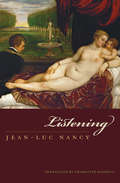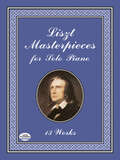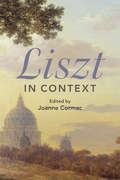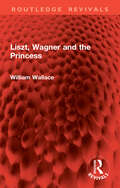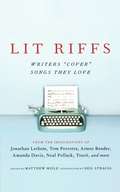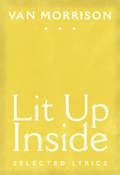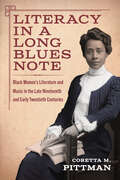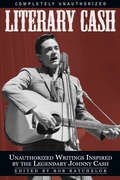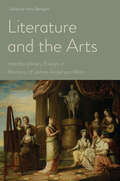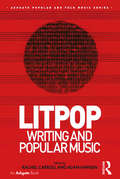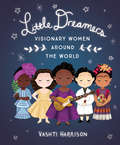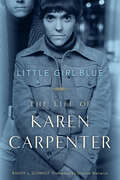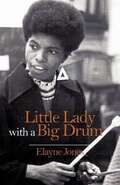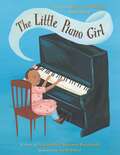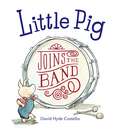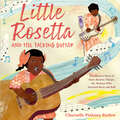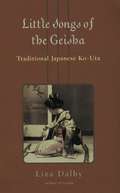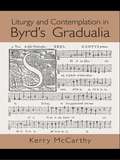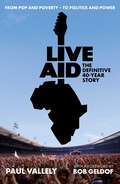- Table View
- List View
Listening: A History Of Our Ears (Perspectives in Continental Philosophy)
by Charlotte Mandell Jean-Luc NancyIn this lyrical meditation on listening, Jean-Luc Nancy examines sound in relation to the human body. How is listening different from hearing? What does listening entail? How does what is heard differ from what is seen? Can philosophy even address listening, écouter, as opposed to entendre, which means both hearing and understanding? Unlike the visual arts, sound produces effects that persist long after it has stopped. The body, Nancy says, is itself like an echo chamber, responding to music by inner vibrations as well as outer attentiveness. Since “the ear has no eyelid” (Quignard), sound cannot be blocked out or ignored: our whole being is involved in listening, just as it is involved in interpreting what it hears. The mystery of music and of its effects on the listener is subtly examined. Nancy’s skill as a philosopher is to bring the reader companionably along with him as he examines these fresh and vital questions; by the end of the book the reader feels as if listening very carefully to a person talking quietly, close to the ear.
Liszt
by Derek WatsonA very carefully researched and written account of the life, times, work and influence of Franz Liszt (1811-1886), who was from every point of view the most complex of men, an awesome constellation of restless contradictions. Contains many musical illustrations and references to a vast literature, also a cleverly organized and usefully detailed calendar and an exhaustive list of Liszt's works in diverse forms. Absorbing as bedtime reading material, but valuable also as a scholarly resource. Nicely produced, with several pages of photographic material.
Liszt
by Sacheverell SitwellBiography of the famous composer, a man of extraordinary magnetism and a pianist of unsurpassed virtuosity. Bibliography and a catalog of Liszt's works included.
Liszt Masterpieces for Solo Piano: 13 Works (Dover Classical Piano Music)
by Franz LisztThis outstanding new compilation of piano works by the supreme piano virtuoso of the 19th century includes such masterworks as Sonetto 104 di Petrarca, Hungarian Rhapsody No. 2 in C-sharp minor, Un Sospiro (Concert Etude No. 3 in D-flat major), Funérailles (from Années de pélerinage), Consolation No. 3 in D-Flat major, Liebestraum No. 3 in A-flat major, and La Campanella (Paganini Etude No. 3). Reprinted in one convenient, modestly priced volume that will be treasured by students, musicians, and music lovers.
Liszt and the Symphonic Poem
by Joanne CormacFranz Liszt was preoccupied with a fundamental but difficult question: what is the content of music? His answer lay in his symphonic poems, a group of orchestral pieces intended to depict a variety of subjects drawn from literature, visual art and drama. Today, the symphonic poems are usually seen as alternatives to the symphony post-Beethoven. Analysts stress their symphonic logic, thereby neglecting their 'extramusical' subject matter. This book takes a different approach: it returns these influential pieces to their original performance context in the theatre, arguing that the symphonic poem is as much a dramatic as a symphonic genre. This is evidenced in new analyses of the music that examines the theatricality of these pieces and their depiction of voices, mise-en-scne, gesture and action. Simultaneously, the book repositions Liszt's legacy within theatre history, arguing that his contributions should be placed alongside those of Mendelssohn, Berlioz and Wagner.
Liszt in Context (Composers in Context)
by Joanne CormacLiszt in Context explores the political, social, philosophical and professional currents that surrounded Franz Liszt and illuminates the competing forces that influenced his music. Liszt was immersed in the religious, political and cultural debates of his day, and moved between institutions, places, and social circles with ease. All of this makes for a rich contextual tapestry against which Liszt composed some of the most iconic, popular, and also contentious music of the nineteenth century. His significance and astonishing reach cannot be over-stated, and his presence in nineteenth-century European culture, and his continuing influence into the twentieth and twenty-first centuries, are overwhelming. The focus on context, reception, and legacy that this volume provides reveals the multifaceted nature of Liszt's impact during his lifetime and beyond.
Liszt, Wagner and the Princess (Routledge Revivals)
by William WallaceOriginally published in 1927, this illuminating study concerns three people, about two of whom much has already been written. The third, Princess Carolyne Sayn-Wittgenstein, has attracted less attention, in spite of her having occupied the greater part of Liszt’s inner life. The Princess in the large sense was an unmusical woman. It is a question whether her influence over Liszt was of a beneficient nature. She interested herself in Berlioz only for the purpose of checkmating Wagner, whom she hated, and thus set Liszt against Wagner whenever possible. The complex relationships of this inscrutable and not altogether scrupulous trio are here considered for the first time in a way which adds much of value to our estimate of the characters of Wagner and Liszt.
Liszt: The Artist as Romantic Hero
by Eleanor PerenyiBiography of the famous composer, his romantic origins, his grand and literary passions, his years of pilgrimage, his stays at Vienna and Weimar. Includes a chronology and bibliography.
Lit Riffs
by J. T. LeRoy Jonathan Lethem Amanda Davis Touré Aimee Bender Neal Pollack Matthew Miele Heidi Julavitz Tom Perrotta Lester BangsFollowing in the footsteps of the late great Lester Bangs -- the most revered and irreverent of rock 'n' roll critics -- twenty-four celebrated writers have penned stories inspired by great songs. Just as Bangs cast new light on a Rod Stewart classic with his story "Maggie May," about a wholly unexpected connection between an impressionable young man and an aging, alcoholic hooker, the diverse, electrifying stories here use songs as a springboard for a form dubbed the lit riff. Alongside Bangs's classic work, you'll find stories by J.T. LeRoy, who puts a recovering teenage drug abuser in a dentist's chair with nothing but the Foo Fighters's "Everlong" -- blaring through the P.A. -- to fight the pain; Jonathan Lethem, whose narrator looks back on his lost innocence just as an extramarital affair careens to an end -- this to the tune "Speeding Motorcycle" as recorded by Yo La Tengo; and Jennifer Belle, who envisions a prequel to Paul Simon's "Graceland" -- one that takes place at a children's birthday party replete with a real live kangaroo. With original contributions from Tom Perrotta, Nelson George, Amanda Davis, Lisa Tucker, Aimee Bender, Darin Strauss, and many more -- riffing on everyone from Tom Waits and Bruce Springsteen to the White Stripes, Cat Power, and Bob Marley -- this is both an astounding collection of short stories and an extraordinary experiment in words and music. Soundtrack available from Saturation Acres Music & Recording Co.
Lit Up Inside
by Ian Rankin David Meltzer Eamonn Hughes Van MorrisonVan Morrison is one of a handful of truly iconic twentieth century artists. Along with Bob Dylan, he was one of the first contemporary lyricists to infuse a serious poetic sensibility into popular music. A colossal influence on a wide range of fellow musicians, he has been a singular beacon of artistic integrity, soulful conviction and musical excellence.One of the greatest singer/songwriters of all time, Morrison has been following his muse in an uncompromising way since the early Sixties. He has explored soul, jazz, blues, rhythm & blues, rock and roll, Celtic folk, pop balladry and more, forging a distinctive amalgam that has Morrison's unvarnished passion at its core. He has referred to his music as "Caledonia soul," reflecting his deep immersion in American roots music and Ulster-Scots.This personal selection of what Morrison himself has judged to be his most important and enduring lyrical work will stand as a landmark public statement from an otherwise intensely private artist, an intimate and very intentional view onto what Morrison himself esteems as his creative contribution. The introduction by Eamonn Hughes, of Queen's University, Belfast, gives a career-long overview of the creative influences Morrison has absorbed and channeled through the years, and the forewords by poet David Meltzer and novelist Ian Rankin provide an appreciation of the writer's craft demonstrated in Morrison's evocative, timeless lyrics.A must for any fan, and a solid introduction to this singular, iconic talent. "'Tupelo Honey' has always existed and Van Morrison was merely the vessel and the earthly vehicle for it."-Bob Dylan"I know of no music that is more lucid, feelable, hearable, seeable, touchable, no music you can experience more intensely than this. Not just moments, but extended . . . periods of experience which convey the feel of what films could be: a form or perception which no longer burls itself blindly on meanings and definitions, but allows the sensuous to take over and grow . . . where indeed something does become indescribable."-Wim Wenders, filmmaker"No other Irish poets-writing either in verse or in music--have come within a Honda's roar of Patrick Kavanagh and Van Morrison"-Paul Durcan
Literacy in a Long Blues Note: Black Women’s Literature and Music in the Late Nineteenth and Early Twentieth Centuries (Margaret Walker Alexander Series in African American Studies)
by Coretta M. PittmanLiteracy in a Long Blues Note: Black Women’s Literature and Music in the Late Nineteenth and Early Twentieth Centuries traces the evolution of Black women’s literacy practices from 1892 to 1934. A dynamic chronological study, the book explores how Black women public intellectuals, creative writers, and classic blues singers sometimes utilize singular but other times overlapping forms of literacies to engage in debates on race. The book begins with Anna J. Cooper’s philosophy on race literature as one method for social advancement. From there, author Coretta M. Pittman discusses women from the Woman’s and New Negro Eras, including but not limited to Angelina Weld Grimké, Gertrude “Ma” Rainey, and Zora Neale Hurston. The volume closes with an exploration of Victoria Spivey’s blues philosophy. The women examined in this book employ forms of transformational, transactional, or specular literacy to challenge systems of racial oppression. However, Literacy in a Long Blues Note argues against prevalent myths that a singular vision for racial uplift dominated the public sphere in the latter decade of the nineteenth century and the early decades of the twentieth century. Instead, by including Black women from various social classes and ideological positions, Pittman reveals alternative visions. Contrary to more moderate predecessors of the Woman’s Era and contemporaries in the New Negro Era, classic blues singers like Mamie Smith advanced new solutions against racism. Early twentieth-century writer Angelina Weld Grimké criticized traditional methods for racial advancement as Jim Crow laws tightened restrictions against Black progress. Ultimately, the volume details the agency and literacy practices of these influential women.
Literary Cash: Unauthorized Writings Inspired by the Legendary Johnny Cash
by Bob BatchelorThe legendary lyrics of Johnny Cash are the inspiration for this collection of extraordinarily creative works that provides a new spin on this musical legend. For nearly five decades, Cash captivated audiences with his unique voice and candid portrayal of the gritty life of a working man, and his songs continue to strike a chord with listeners today. But it is the stories behind the music that remain with audiences and provide the inspiration for the work in this thoughtful compilation of fiction and non-fiction from contributors such as Lauren Baratz-Logsted, Don Cusic, Gretchen Moran Laskas, Amanda Nowlin, and Russell Rowland.
Literature and the Arts: Interdisciplinary Essays in Memory of James Anderson Winn
by David Hopkins Peter Sabor Amanda Eubanks Winkler Paul Hammond Steven N Zwicker Paula R. Backscheider Anna Battigelli Andrew Walkling Cedric D Reverand Ellen T Harris Melissa A SchoenbergerThe ten essays in Literature and the Arts explore the intermedial plenitude of eighteenth-century English culture, honoring the memory of James Anderson Winn, whose work demonstrated how seeing that interplay of the arts and literature was essential to a full understanding of Restoration and eighteenth-century English culture. Scenery, machinery, music, dance, and texts transformed one another, both enriching and complicating generic distinctions. Artists were alive to the power of the arts to reflect and shape reality, and their audience was quick to turn to the arts as performative pleasures and critical lenses through which to understand a changing world. This collection's eminent authors discuss estate design, musicalized theater, the visual spectacle of musical performance, stage machinery and set designs, the social uses of painting and singing, drama’s reflection of a transformed military infrastructure, and the arts of memory and of laughter.
Litpop: Writing And Popular Music (Ashgate Popular and Folk Music Series)
by Adam Hansen Rachel CarrollBringing together exciting new interdisciplinary work from emerging and established scholars in the UK and beyond, Litpop addresses the question: how has writing past and present been influenced by popular music, and vice versa? Contributions explore how various forms of writing have had a crucial role to play in making popular music what it is, and how popular music informs ’literary’ writing in diverse ways. The collection features musicologists, literary critics, experts in cultural studies, and creative writers, organised in three themed sections. ’Making Litpop’ explores how hybrids of writing and popular music have been created by musicians and authors. ’Thinking Litpop’ considers what critical or intellectual frameworks help us to understand these hybrid cultural forms. Finally, ’Consuming Litpop’ examines how writers deal with music’s influence, how musicians engage with literary texts, and how audiences of music and writing understand their own role in making ’Litpop’ happen. Discussing a range of genres and periods of writing and popular music, this unique collection identifies, theorizes, and problematises connections between different forms of expression, making a vital contribution to popular musicology, and literary and cultural studies.
Little Dreamers: Visionary Women Around the World (Vashti Harrison)
by Vashti HarrisonFrom the New York Times bestselling author of Little Leaders: Bold Women in Black History comes the highly anticipated follow-up, a beautifully illustrated collectible detailing the lives of women creators around the world.Featuring the true stories of 40 women creators, ranging from writers to inventors, artists to scientists, Little Dreamers: Visionary Women Around the World inspires as it educates. Readers will meet trailblazing women like Mary Blair, an American modernist painter who had a major influence on how color was used in early animated films, actor/inventor Hedy Lamar, environmental activist Wangari Maathai, architect Zaha Hadid, filmmaker Maya Deren, and physicist Chien-Shiung Wu. Some names are known, some are not, but all of the women had a lasting effect on the fields they worked in.The charming, information-filled full-color spreads show the Dreamers as both accessible and aspirational so reader knows they, too, can grow up to do something amazing.
Little Girl Blue: The Life of Karen Carpenter
by Dionne Warwick Randy L. SchmidtAn intimate profile of one of the most popular American singers of the 20th century, this first full-length biography of Karen Carpenter details every aspect of her life, from her modest Connecticut upbringing and her rise to stardom in southern California to the real story of her tragic, untimely death. This illuminating depiction of a 1970s icon covers her time as lead singer of the Carpenters--the top-selling American musical act of the decade--and provides insight into their string of 16 consecutive top-20 hits, including "Close to You," "We've Only Just Begun," "Top of the World," and "Superstar," as well as a critical review of her aborted solo career. A behind-the-scenes look into the life of a superstar, from the prolific recordings and the relentless touring to the awards, fame, and fortune, this history also chronicles her struggle with anorexia nervosa and gives important new details from her autopsy that shed new light on her death at age 32. Groups such as Sonic Youth and the Corrs and artists including k. d. lang and Madonna have cited Karen Carpenter among their major influences, and this definitive biography, based on exclusive interviews with nearly 100 of her friends and associates, is a testament to her brief yet remarkable life.
Little Lady With a Big Drum
by Elayne JonesThis, the official autobiography of Elayne Jones, is the story of one woman's remarkable life and career in her own words; a journey from meager beginnings as a self-described "skinny little girl from Harlem," to the highest echelons of classical music. With a musical talent and personal drive that enabled her to transcend racial and gender barriers, Jones became the first African American woman in the New York Philharmonic Symphony Orchestra. A world renown tympanist, Elayne Jones is a graduate of the Arts and Music High School in New York. She then attended Juilliard, being among the first winners of the Ellington Juilliard Scholarship. Jones' professional career began in 1949 with the New York City Opera. Over the course of five decades, Elayne Jones played with the American Ballet Theatre, Arthur Fiedler and the World Symphony Orchestra, Leopold Stokowski and the American Symphony Orchestra, Seiji Ozawa and the San Francisco Symphony, and the San Francisco Opera. In 1965 she won the LaGuardia Memorial Award in recognition of her outstanding achievements in music. She has presented over 375 solo lecture demonstrations nationally and internationally of percussion instruments in schools and colleges, and in 1975, National Educational Television produced and aired a TV special on PBS featuring Jones entitled, "A Day in the Life of a Musician." Countless performances by Jones include television, recordings, musicals, and ballets. Elayne Jones is universally recognized as one of the most prominent African Americans of the 20th Century. Alongside music, Jones was also an accomplished amateur tennis player for some 43 years, until an injury forced her to give up the game. Some of the high points in playing included tennis matches with tenor Luciano Pavarotti and conductor Seiji Ozawa. Jones retired from her career in music in 1998. A mother of three, she currently resides in the San Francisco East Bay Area, in Walnut Creek, California.
Little Melba And Her Big Trombone
by Frank Morrison Katheryn Russell-BrownMelba Doretta Liston loved the sounds of music from as far back as she could remember. As a child, she daydreamed about beats and lyrics, and hummed along with the music from her family's Majestic radio. At age seven, Melba fell in love with a big, shiny trombone, and soon taught herself to play the instrument. By the time she was a teenager, Melba's extraordinary gift for music led her to the world of jazz. She joined a band led by trumpet player Gerald Wilson and toured the country. Overcoming obstacles of race and gender, Melba went on to become a famed trombone player and arranger, spinning rhythms, harmonies, and melodies into gorgeous songs for all the jazz greats of the twentieth century: Randy Weston, Duke Ellington, Count Basie, Billie Holiday, and Quincy Jones, to name just a few. Brimming with ebullience and the joy of making music, Little Melba and Her Big Trombone is a fitting tribute to a trailblazing musician and a great unsung hero of jazz.
Little Piano Girl
by Ann IngallsWhat if you loved music more than anything? Suppose you had just learned to play the piano. Imagine that your family has to move to a new city and you have to leave your piano behind. People don't like you in the new city because of what you look like. How will you make yourself feel better? Mary Lou Williams, like Mozart, began playing the piano when she was four; at eight she became a professional musician. She wrote and arranged music for Duke Ellington, Charlie Parker and Dizzy Gillespie, and was one of the most powerful women in jazz. This is the story of Mary Lou's childhood in Pittsburgh, where she played the piano for anyone who would listen.
Little Pig Joins the Band
by David Hyde CostelloLittle Pig has trouble keeping up with his four older—and bigger—brothers and sisters. When a visit to Grandpa's house turns into a rummage through Grandpa's old marching-band instruments, Little Pig is too small to play any of them. But when the disorganized band has a pig-pile mishap, Little Pig has a BIG idea: They could use a leader. David Hyde Costello's warm illustrations and goofy speech-bubble dialogue add giggles galore to this iconic story of little-siblinghood. Perfect for youngests, oldests, and everyone in between!
Little Rosetta and the Talking Guitar: The Musical Story of Sister Rosetta Tharpe, the Woman Who Invented Rock and Roll
by Charnelle Pinkney BarlowA picture-book biography of Sister Rosetta Tharpe, the woman who invented rock and roll—a warm, inspiring tale of a childhood filled with music, community, and a drive to succeed."Music is the heart of our story," says Momma to young Rosetta, surprising her with her first guitar. Rosetta's strums sound like ker-plunks. But with practice and determination, she makes music, fingers hopping "like corn in a kettle," notes pouring over the church crowd "like summer rain washing the dust off a new day."In this stunning picture book, author and illustrator Charnelle Pinkney Barlow imagines the childhood of Sister Rosetta Tharpe, whose rural roots inspired the music we still hear today.Young readers will see a child's dream become reality through hard work and perseverance. And they'll learn the overlooked story of a pioneering Black artist, whose contribution to music history is only now being discovered.
Little Songs of the Geisha
by Liza DalbyA fascinating look into the world of the Geisha through the 400-year-old art of Ko-Uta, the traditional song form sung to three-stringed shamisen music. A vivid evocation of the romanticism of feudal Japan.
Little Songs of the Geisha
by Liza DalbyA fascinating look into the world of the Geisha through the 400-year-old art of Ko-Uta, the traditional song form sung to three-stringed shamisen music. A vivid evocation of the romanticism of feudal Japan.
Liturgy and Contemplation in Byrd's Gradualia
by Kerry McCarthyWilliam Byrd’s Gradualia is one of the most unusual and elaborate musical works of the English Renaissance. <P><P> This large collection of liturgical music, 109 pieces in all, was written for clandestine use by English Catholics at a time when they were forbidden to practice their religion in public. When Byrd began to compose the Gradualia, he turned from the penitential and polemical extravagances of his earlier Latin motets to the narrow, carefully ordered world of the Counter-Reformation liturgy. It was in this new context, cut off from his familiar practice of choosing colorful texts and setting them at length, that he first wrote about the "hidden and mysterious power" of sacred words to evoke a creative response. <P><P> Liturgy and Contemplation in Byrd’s Gradualia responds to Byrd’s own testimony by exploring how he read the texts of the Mass and the events of the church calendar. Kerry McCarthy examines early modern English Catholic attitudes toward liturgical practice, meditation, and what the composer himself called "thinking over divine things." She draws on a wide range of contemporary sources — devotional treatises, commentaries on the Mass, poetry, memoirs, letters, and Byrd’s dedicatory prefaces — and revisits the Gradualia in light of this evidence. The book offers a case study of how one artist reimagined the creative process in the final decades of his life.
Live Aid: The Definitive 40 Year Story
by Paul VallelyThe authoritative, official inside story of 40 years of Live Aid, from Band Aid to todayIn 1985, with £100+ million in his back pocket from Live Aid – the greatest rock concert the world had ever seen – Bob Geldof took a trip across Africa to decide how to spend the money he had raised for the Ethiopian famine. He asked Paul Vallely to go with him. Over the next four decades Vallely became one of Geldof&’s closest advisers – travelling with him to meet the world&’s top rock stars and politicians. Here, for the first time, Vallely gives his full eye-witness account of those 40 years. The book, which has a foreword by Bob Geldof, is crammed with stories of how pop, poverty, politics and power are interwoven in the Live Aid story. Geldof encounters presidents, prime ministers and popes as well as the pop heroes who adorned his bedroom wall as a boy. Bob drinks late-night whisky with Margaret Thatcher, is forced to write a grovelling apology to Bill Clinton and meets Vladimir Putin on a boat in the Mediterranean. He pressurises The Who, sweet talks Pink Floyd, and is awestruck by Bowie. Is Bob Geldof a bully or a charmer, saint or &‘white saviour&’, or simply a force of nature?But there is more to this than music. The journey from Live Aid to Live 8 was one from giving money to calling for action, from charity to justice – and an entire generation went on it with him. Live 8 in 2005 was the largest gathering in human history. Its eight simultaneous concerts created a seismic event which the leaders of the world&’s most powerful nations could not ignore. It made a whole generation feel they could make a difference. In more ways than one, Live Aid rocked the world.
